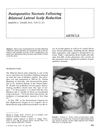73 citations,
October 2013 in “International Journal of Cosmetic Science” Chemical hair straightening can damage hair and health, needing safer alternatives and stricter regulations.
50 citations,
July 1981 in “Archives of Dermatology” DNCB helps regrow hair in alopecia areata patients, but safer alternatives are needed.
 1 citations,
June 2013 in “Clinics in dermatology”
1 citations,
June 2013 in “Clinics in dermatology” Herbs may be safer and effective for treating hair loss.
 October 2023 in “Benha Journal of Applied Sciences”
October 2023 in “Benha Journal of Applied Sciences” Methotrexate and vitamin D3 are potentially more effective and safer than triamcinolone for treating localized alopecia areata.
5 citations,
April 2022 in “Egyptian Journal of Chemistry” Sansevieria trifasciata shows promise as a natural treatment for hair loss.
 98 citations,
November 2002 in “Contact Dermatitis”
98 citations,
November 2002 in “Contact Dermatitis” Many people had severe allergic reactions to a common hair dye ingredient, causing them to seek medical care and miss work.
 February 2024 in “International journal of biology, pharmacy and allied sciences”
February 2024 in “International journal of biology, pharmacy and allied sciences” Plant-based treatments can effectively and safely treat hair loss.
February 2022 in “Journal of pharmaceutical research international” The herbal baby shampoo is safe, cleans well, and promotes healthy hair.
 14 citations,
May 1988 in “The Journal of Dermatologic Surgery and Oncology”
14 citations,
May 1988 in “The Journal of Dermatologic Surgery and Oncology” The conclusion is that bilateral lateral scalp reduction has a high risk of severe complications, leading doctors to stop using it.
23 citations,
June 2014 in “International Journal of Cosmetic Science” Glyoxylic acid is a safer alternative to formaldehyde for hair straightening and effectively changes hair structure.
 39 citations,
October 2015 in “Case Reports”
39 citations,
October 2015 in “Case Reports” Some people experience severe, long-lasting side effects from fluoroquinolone antibiotics, leading to the recommendation of limited use and increased awareness of these risks.
 October 2024 in “International Journal of Ayurveda Research”
October 2024 in “International Journal of Ayurveda Research” Emblica officinalis and Eclipta alba may help treat hair loss naturally.
 61 citations,
May 2016 in “Scientific reports”
61 citations,
May 2016 in “Scientific reports” The peptide IMT-P8 can effectively deliver proteins into the skin and cells for potential skin treatments.

Dianabol boosts muscle growth but has serious health risks and legal issues.
 15 citations,
October 2016 in “Journal of dermatological treatment”
15 citations,
October 2016 in “Journal of dermatological treatment” Proper hair care can prevent and stop hair breakage in people with acquired trichorrhexis nodosa.
 10 citations,
December 2019 in “International journal of medicinal chemistry”
10 citations,
December 2019 in “International journal of medicinal chemistry” Chemicals from the plant Dicerocaryum senecioides were found to safely speed up and increase hair growth in mice.
 7 citations,
January 2009 in “Immunological investigations”
7 citations,
January 2009 in “Immunological investigations” A 3-year-old boy lost all his hair due to a rare reaction to phenobarbital, but it grew back after steroid treatment.
 July 2024 in “Forum Dermatologicum”
July 2024 in “Forum Dermatologicum” Topical treatments for hair loss can be effective but need careful safety evaluation.
 May 2004 in “Pediatric Dermatology”
May 2004 in “Pediatric Dermatology” Atopic dermatitis may have genetic causes and can be treated with pharmacologic methods, glycerin creams, and controlling Staphylococcus aureus colonization.
 April 2024 in “MGM Journal of Medical Sciences”
April 2024 in “MGM Journal of Medical Sciences” Traditional Indian home remedies are effective and culturally important.
 March 2023 in “Jurnal Ilmiah Medicamento”
March 2023 in “Jurnal Ilmiah Medicamento” The hair tonic from Usada Bali plants increased hair growth without irritating the skin.

Nanoformulations improve luteolin's effectiveness as a cancer treatment.
 March 2024 in “Nutrients”
March 2024 in “Nutrients” Gynostemma pentaphyllum and its component damulin B could help hair grow by activating certain cell pathways.
114 citations,
March 2010 in “Zebrafish” PROTO1 and PROTO2 protect against hearing damage.
36 citations,
August 2022 in “Molecular Therapy — Nucleic Acids” Gene therapy shows promise for healing chronic wounds but needs more research to overcome challenges.
 4 citations,
January 2023 in “The journal of allergy and clinical immunology/Journal of allergy and clinical immunology/The journal of allergy and clinical immunology”
4 citations,
January 2023 in “The journal of allergy and clinical immunology/Journal of allergy and clinical immunology/The journal of allergy and clinical immunology” Biologics, especially Dupilumab, are effective and safe for treating severe childhood eczema.
 October 2024 in “Cosmoderma”
October 2024 in “Cosmoderma” Proper hair care and suitable products are essential for men's scalp health and well-being.
 March 2024 in “Clinical, Cosmetic and Investigational Dermatology”
March 2024 in “Clinical, Cosmetic and Investigational Dermatology” Saudi dermatologists know about low-dose oral minoxidil for hair loss but don't often prescribe it, partly due to its unavailability.
52 citations,
April 2016 in “Journal of the American Academy of Dermatology” Certain black hairstyling practices increase the risk of traction alopecia, requiring better management and education.
 55 citations,
December 2006 in “Journal of The American Academy of Dermatology”
55 citations,
December 2006 in “Journal of The American Academy of Dermatology” Antidepressants called SSRIs can cause skin problems, bleeding risk, and other side effects.





















